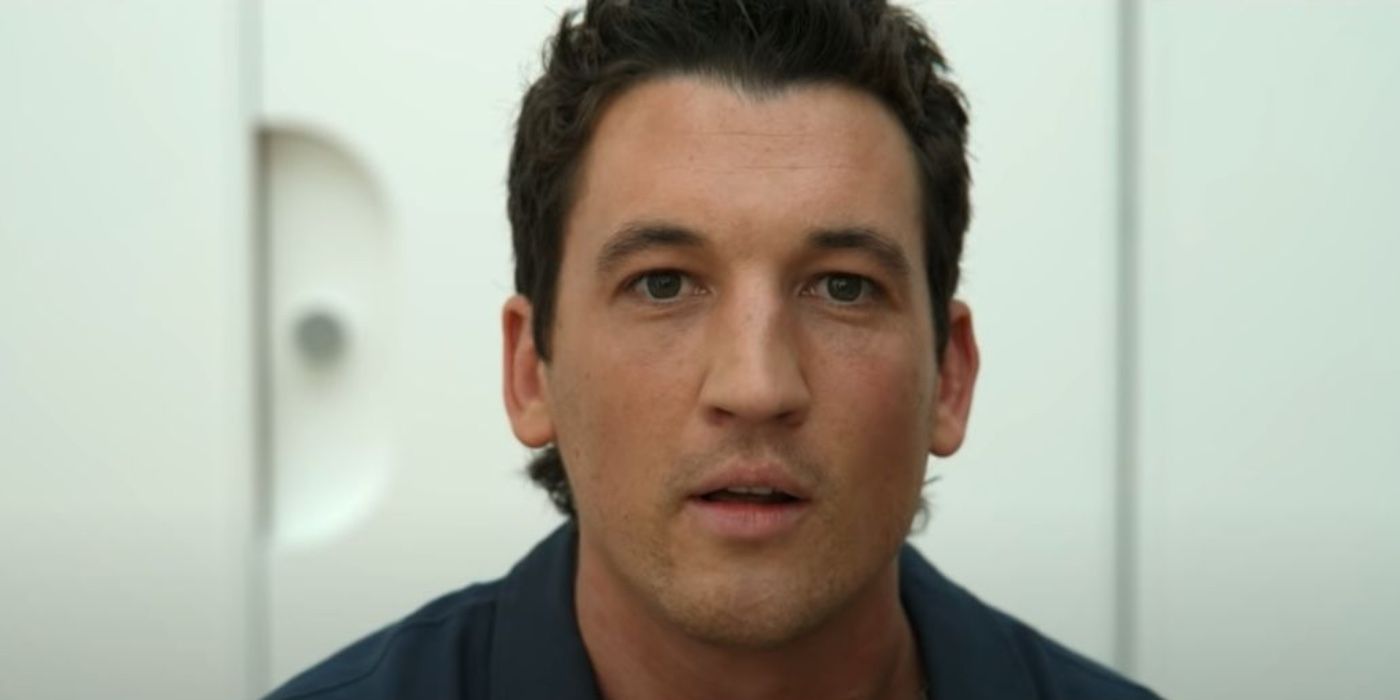
Warning: Spoilers for Spiderhead below.
Netflix’s Spiderhead changes significant details from "Escape from Spiderhead," George Saunder’s short story on which it's based. A number of these changes are unsurprisingly additions, clearly inserted in an effort to develop fewer than 40 pages into a feature-length film. However, some of the changes in Spiderhead completely contradict the events that occur in the source material.
Spiderhead and Escape From Spiderhead both focus on Jeff (Miles Teller) as he is forced to partake in drug trials run by Steve Abnesti (Chris Hemsworth) in a specialized prison facility. These trials become increasingly sinister, building from the relatively harmless eloquence of Verbaluce, to the suicide-inducing Darkenfloxx. On the page and on the screen, the story ends with Jeff’s escape from the facility, but in completely different contexts.
While the changes aren’t necessarily bad, Netflix’s Spiderhead, which was an opportunity to redeem Netflix after Red Notice, seems to overlook some of the central themes of Saunder’s "Escape from Spiderhead." These include character additions, shifted focuses, and an unexpectedly hopeful ending. Here are the biggest changes from Saunders’ story to Netflix’s adapation.

Spiderhead’s first tonal shift occurs when Steve Darkenfloxxes Heather, which causes her to take her own life. This plays out the same way in the short story. However, while Heather’s death is more gruesome in the movie, a twisted plot detail is omitted. In the name of scientific consistency, book-Steve also plans to Darkenfloxx Rachel, the other woman Jeff was chemically induced into having sex with. This creates the final conflict in the short story, but as Spiderhead went in another direction, this cut makes sense.

Spiderhead, which isn't the only Netflix movie of summer 2022, includes many sweeping shots of the beautiful outside world. In Saunders’ story, however, the reader is never included in what lies beyond the facility until Jeff makes his escape at the end. While a subtle difference, the wider cinematic focus throughout helps set up the getaway during Spiderhead’s climax. This setup isn’t needed in the story as it ends differently.

Despite having a central role in Spiderhead, Lizzy's character wasn’t in the original short story at all. She has a clear function, however, which justifies her inclusion in the movie. One of Abnesti’s trials focuses on manufacturing love. When under the influence of ED289/290, Jeff falls in love with both Heather and Rachel but afterward feels nothing. Lizzy serves as a non-artificial relationship, a comparison of true love to Abnesti’s invented version.

Abnesti is an antagonist in "Escape from Spiderhead," but he lacks the depth of Hemsworth’s version in Spiderhead. Chris Hemsworth is a household name, set to reprise his role as Thor in Love & Thunder, so it would have been wasteful to under-utilize an actor with as much star power as him. Additionally, the increased focus on his motivations and background also adds a personal touch to the narrative. Saunders’ story, for example, never reveals Abnesti’s issues with his father. Additionally, there is not a clear reason why he is conducting the trials in the story; in order to make Abnesti a more traditional villain, Spiderhead deliberately interrogates his motivations in a way that Saunders didn’t need to.

One of the film’s more redundant changes is the reinvention of Jeff’s criminal past. In the story, Jeff is imprisoned for hitting someone with a brick during a fight and is charged with manslaughter. In the Spiderhead movie, directed by Top Gun: Maverick's Joseph Kosinski, Jeff crashes his car while under the influence of alcohol, killing both his girlfriend and friend. Not only are the in-depth depictions of his crime an unnecessary addition to the story, but it is also unclear why Jeff’s crime couldn’t stay the same.
Prisoners’ backgrounds are sometimes used against them as a reason to be Darkenfloxxed. Lizzy, for example, is tortured by herself and by Abnesti with the knowledge that she is responsible for her baby’s death. However, this is never properly explored in Jeff’s context, making the switch to a more emotional backstory entirely superficial.

In the film’s final act, Jeff discovers the reason behind the drug trials: Abnesti has been trying to perfect B-6, a drug that will allow people to be controlled. In a final showdown that involves Miles Teller resurrecting his Insurgent knife skills, Abnesti explains his master plan to Jeff, which Jeff then foils by alerting the authorities and escaping the facility. B-6 was never a part of the short story, yet it doesn't feel out of place in Spiderhead. Saunders keeps many details ambiguous, and while this works in a written format, it would have been unsatisfying in a visual medium. Adding an explanation and a grander scheme of world domination helps to better situate the smaller concepts interrogated through Spiderhead.

At the end of Spiderhead, Abnesti’s pursuit of Jeff and Lizzy comes to an end when he crashes his plane into the side of a mountain. Given that the entire facility and pharmaceutical experiment is his, it is implied that Abnesti’s death marks the end of his twisted drug trials. There is no such suggestion in Saunders’ stor. When Jeff makes his escape, the facility is still running and Abnesti is still alive. The story’s ending is a symbolic victory for Jeff as a person, but it is not the societal victory represented in the Spiderhead movie.

In perhaps the biggest change from the source material, Jeff is given a happy ending in Netflix’s Spiderhead. In the story, after refusing to Darkenfloxx Rachel, he administers the drug on himself and flees the facility. Outside, he awaits his own death, finally at peace with the knowledge that he refused to help Abnesti kill someone.
This probably wouldn’t have worked on-screen, especially considering a sequel is already being discussed. It's uncertain whether Spiderhead will hold up against other anticipated sci-fi movies coming in 2022, but this change does display a certain amount of willful ignorance on the filmmaker’s part. Big Pharma remains unfazed in George Saunders’ story; however, in the movie, Jeff is able to take down the facility and sail off into the sunset with a beautiful accomplice on his arm. For a fairly dystopian story, the sweetness of Spiderhead’s ending feels a little out of place.
Netflix's Spiderhead takes its premise from George Saunders' story Escape from Spiderhead, but there are plenty of changes and additions to the movie.Christopher Malpas
